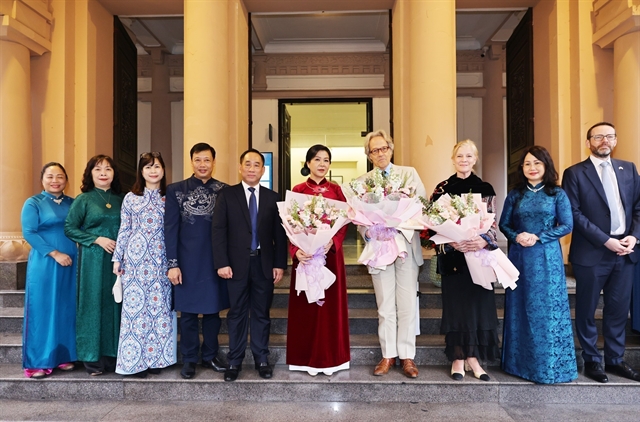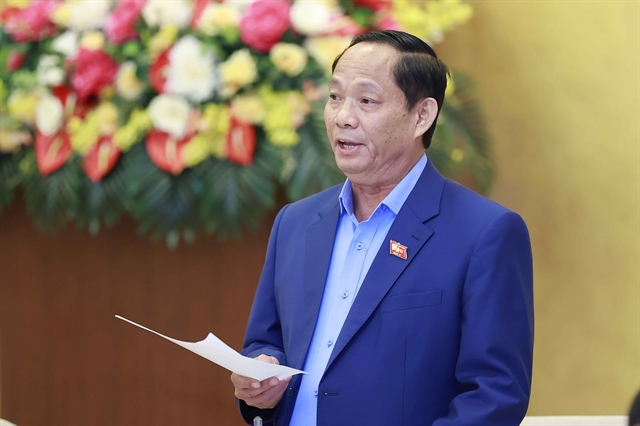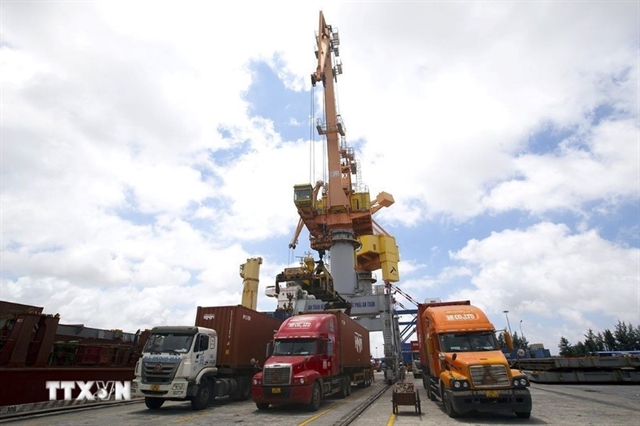 Politics & Law
Politics & Law


|
| National Assembly Deputy Chairman Trần Quang Phương delivers his speech at the meeting on Wednesday morning. — VNA/VNS Photo Doãn Tấn |
HÀ NỘI — While discussing the draft Law on Consumer Rights Protection, National Assembly deputies suggested including organisations in the definition of a 'consumer'.
They also advised simplifying procedures for the trial of disputes related to protecting consumer interests.
The issues were raised by National Assembly (NA) deputies on Wednesday morning at the 20th session of the National Assembly Standing Committee in Hà Nội.
NA General Secretary Bùi Văn Cường said the concept of a 'consumer' in the draft law should be “a consumer is an individual or organisation that buys and uses products, goods and services for consumption and daily purposes of individuals, families or organisations and not for commercial purposes”.
He said the definition has to include both organisations and individuals.
Lê Thị Nga, chairwoman of the NA's Committee for Judicial Affairs, also agreed with the definition of a consumer consisting of both individuals and organisations.
This definition of the consumer will create a quick and effective protection mechanism if a large number of consumers are impacted due to violations by producers, such as schools and businesses buying consumer goods for students and workers.
NA Deputy Chairman Trần Quang Phương said that the definition of a consumer needs to consist of both organisations and individuals in the draft law so that the law can cover and solve problems related to consumption among organisations, which is believed to be a relatively complex problem.
Regarding simplifying procedures for the trial of disputes related to protecting consumer interests, head of the NA's Committee for Legal Affairs Hoàng Thanh Tùng said it is necessary to shorten procedures to handle small and low-value disputes to avoid wasting time.
However, Tùng also suggested it should clarify why procedures for the trial of disputes related to protecting consumer interests have not been simplified.
“What is the cause of the situation,” he added.
"We also need to ask the opinion of the Supreme People's Court on the issue," he said.
Nga, chairwoman of the NA's Committee for Judicial Affairs, said for small and low-value disputes with clear evidence, it is better to simplify procedures.
However, Nga also added that it has to further work with the Supreme People's Court and the Supreme People's Procuracy on this issue.
Speaking at the meeting, NA Chairman Vương Đình Huệ agreed with the proposal of shortening procedures but he told relevant agencies to review the provisions of the Civil Procedure Code on the issue.
Vũ Hồng Thanh, chairman of the NA's Committee for Economic Affairs, said that there are a significant number of trials related to protecting the interests of consumers.
So, if the process is shortened, it will be more convenient to quickly protect the interests of both individuals and organisations, he said.
NA Deputy Chairman Phương ordered the draft law’s compiling agency to inherit the current laws and ensure consistency with the provisions of the Civil Procedure Code.
Lê Quang Huy, head of the NA’s Committee for Science, Technology and Environment, who presented a verification report of the committee for the draft law, said the draft law has supplemented and completed many mechanisms to better protect the interests of consumers such as regulating the common responsibilities of organisations and individuals doing business in cyberspace (Clause 2, Article 39); regulating specific responsibilities of the organisations setting up and operating the intermediary digital platform (Clause 3, Article 39); authenticating the identity of organisations and individuals selling goods and providing services on digital platforms (Clause 1, Article 39); and fulfilling the obligation to receive authorisation from consumers during transactions on digital platforms (Clause 3, Article 39).
In addition, the draft law has many provisions to create conditions for social organisations to participate in the implementation of consumer protection, he said.
It also stipulates the development of a coordination mechanism and assigns specific responsibilities of relevant ministries, agencies and organisations in protecting consumers’ interests, he said. — VNS




